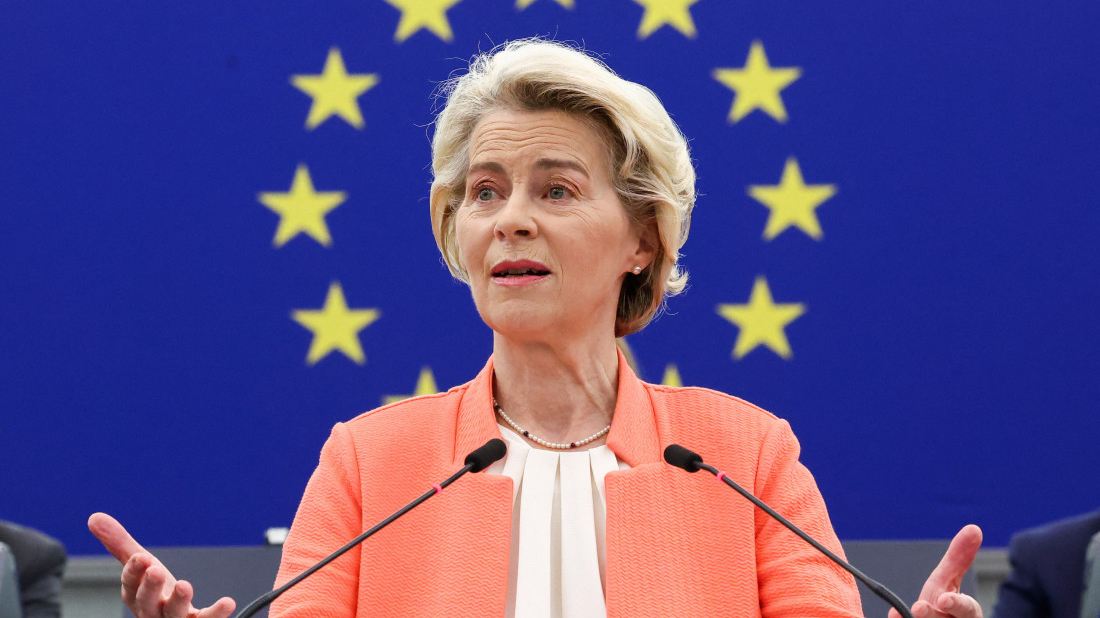live Israeli military says it has launched fresh strikes on Tehran: All the latest news on the Iran strikes
The Israeli military has begun a new wave of strikes on Tehran, it said late on Monday. The strikes came after it issued...

Ursula von der Leyen, President of the European Commission, has proposed exploring "return hubs" outside the EU as a strategy to manage irregular migration, citing a recent agreement between Italy and Albania as a potential model.
Ursula von der Leyen, President of the European Commission, has proposed exploring "return hubs" outside the EU as a strategy to manage irregular migration, citing a recent agreement between Italy and Albania as a potential model.
In a letter to EU national leaders, von der Leyen emphasized the need for new approaches to address irregular migration, highlighting a significant drop in arrivals compared to previous years. EU leaders are set to meet this week for a summit focused on migration strategies, with the commission expected to introduce new measures.
The Italy-Albania deal, which allows Albania to host processing centers for male asylum seekers, is seen as a pivotal step in managing migration flows. The first group of migrants, including 16 men rescued by the Italian coastguard, is scheduled to arrive in Albania soon.
Countries like Germany, France, and Italy have implemented border controls to curb irregular migration, reflecting rising political pressures and public sentiment. Germany, previously more lenient on migration, is now taking a stricter stance ahead of upcoming elections.
Von der Leyen also pointed to successful agreements with Tunisia and Libya, despite criticism from human rights organizations. She noted a two-thirds reduction in irregular arrivals via the central Mediterranean route in 2024, attributing this decline to such agreements.
The Italy-Albania pact, signed by Italian Prime Minister Giorgia Meloni and her Albanian counterpart Edi Rama, involves significant financial investment from Italy, totaling €670 million over five years. The deal includes three newly opened facilities in Albania designed to process asylum claims and manage migrants.
Follow the latest developments and global reaction after the U.S. and Israel launched “major combat operations” in Iran, prompting retaliation from Tehran.
Saudi Arabia’s state oil giant Saudi Aramco closed its Ras Tanura refinery on Monday following an Iranian drone strike, an industry source told Reuters as Tehran retaliated across the Gulf after a U.S.-Israeli attack on Iranian targets over the weekend.
The Kremlin is utilising the recent United States and Israeli military strikes on Iran to validate its ongoing war in Ukraine. Russian officials are pointing to the escalation in the Middle East as evidence that Western nations do not adhere to international rules.
The Middle East crisis intensifies after the deadly attack on the compound of the Supreme Leader of Iran Ali Khamenei on Saturday that killed him, other family members and senior figures. Iran has launched retaliatory strikes on U.S. targets in the region.
Ayatollah Alireza Arafi has moved into a pivotal constitutional role following the death of Supreme Leader Ayatollah Ali Khamenei, becoming the clerical member of Iran’s temporary leadership council under Article 111 of the Constitution of the Islamic Republic of Iran.
Former U.S. President Bill Clinton told lawmakers that President Donald Trump told him he had "some great times" with convicted sex offender Jeffrey Epstein before their relationship soured, according to a video released on Monday (2 March).
The U.S.-Iran crisis has entered its third day, with further strikes reported across the Middle East and the death toll rising. Oil prices have surged to levels last seen during the Covid-19 pandemic, raising fears of economic disruption and higher prices worldwide.
The UK said it's allowing the U.S. to use its bases for defensive strikes against Iran amid escalating missile attacks, after a suspected drone strike hit a British airbase in southern Cyprus, causing limited damage.
The Kremlin is utilising the recent United States and Israeli military strikes on Iran to validate its ongoing war in Ukraine. Russian officials are pointing to the escalation in the Middle East as evidence that Western nations do not adhere to international rules.
European Union stands with its member states in the face of any threat, EU Commission President Ursula von der Leyen said in response to the drone strike that hit Britain's Royal Air Force base of Akrotiri in southern Cyprus overnight.
You can download the AnewZ application from Play Store and the App Store.

What is your opinion on this topic?
Leave the first comment